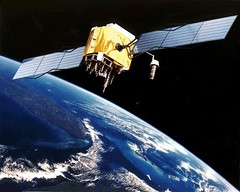Bell to Start Degrading, Charging For Blackberry GPS?
 Competition in Canada’s wireless/telecom industry is a rare sight, but it seems that Bell is trying to compete for the title of “who can shaft their customers hardest”. Via Wellington Financial, according to an internal memo, Bell will degrade GPS service on recent Blackberry models in coming weeks, including the 8830, Pearl, and Curve.
Competition in Canada’s wireless/telecom industry is a rare sight, but it seems that Bell is trying to compete for the title of “who can shaft their customers hardest”. Via Wellington Financial, according to an internal memo, Bell will degrade GPS service on recent Blackberry models in coming weeks, including the 8830, Pearl, and Curve.
Users of free GPS mapping applications (such as Google Maps or even the included Blackberry Maps application by RIM) will see the time required to establish a GPS lock increase to 2-10 minutes, up from the typical 15-20 seconds usually experienced. Additionally, there is some speculation that the resolution of GPS data will also be reduced to a 1-2.5km range as opposed to the existing 10-25m accuracy currently provided — not exactly useful when trying to find the location for your next meeting downtown in an unfamiliar city.
To get the faster, accurate service that users have come to expect, one would be have to subscribe to Bell’s GPS Nav service, $10 a month. How does a mobile provider have control over GPS service, which uses 32 satellites in medium Earth orbit? Most GPS capable phones, including Blackberries, Nokias, HTCs and the iPhone use Assisted GPS. wherein the phone communicates with an AGPS server (run by the mobile provider), to more quickly and accurately calculate a location. Presumably Bell is planning to restrict access to AGPS service to extra-paying customers, or perhaps push some kind of software update to enforce it.
I can’t see how they expect to implement this without greatly upsetting their customers. Overcharging usually only works when the customer is used to overpaying for something, like 10c for a text message, a miniscule amount of data. Starting to charge for that which used to be free won’t go unnoticed, though Bell and Telus already pulled it off when they recently started charging for incoming text messages. It’s already been two days since this story broke. How long will Bell ignore it?
Related tangent: I was down in the US last week, and faced the harsh realization that a GPS phone is somewhat useless in a foreign country if you’re not willing to submit to the steep charges of data roaming. On my iPhone (and many others) maps and directions require Internet access. The iPhone will cache maps to a limited extent, but if you haven’t loaded a part of a map before, you’re out of luck. It’s frustrating when these devices are much more capable than their makers and service providers allow them to be.











